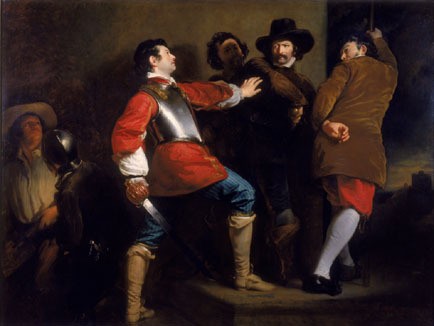
“The Discovery of the Gunpowder Plot,” a painting by Henry Perronet Briggs, circa 1823.
Saturday is Guy Fawkes Day in the United Kingdom, or most of it.
Most of the UK, not most of the day: Guy Fawkes Day “is not celebrated in Northern Ireland,” notes Parliament, which has excellent details on the tradition.
Now we discover that this same Guy Fawkes was the inspiration for the everyday word guy. But lasting fame didn’t come cheap.
Fawkes, as you may know, got caught in a chamber under Parliament with 36 barrels of gunpowder. (36 barrels!) He planned to blow up Parliament and everyone in it the next day, but got caught before he could do the deed. Here’s the part you may not know:
It is still the custom in Britain on, or around, 5th November to let off fireworks. For weeks previously, children have been making guys — effigies supposedly of Fawkes — nowadays usually formed from old clothes stuffed with newspaper, and equipped with a grotesque mask, to be burnt on the November 5th bonfire. The word `guy’ came thus in the 19th century to mean a weirdly dressed person, and hence in the 20th century in the USA to mean, in slang usage, any male person.
Emphasis mine. So next time you say “lookit that guy,” just remember you’re tossing a salute to Guy Fawkes.
What’s the price for having your name go down in history as slang for any male person?
[Fawkes and his co-conspirators] were taken to the Tower of London from 6th November onwards. All of them were then probably subjected to extensive and cruel torture — much used at this time, though never officially sanctioned by English law.
The executions were attended with all the bloody barbarity (including castration, disembowelling alive etc) that the mediaeval punishment for treason, hanging drawing and quartering, demanded… The heads and other portions of the conspirators’ bodies were set up at various points in Westminster and London.
Yikes. Sorry, guy!
See our full Guy Fawkes biography »
